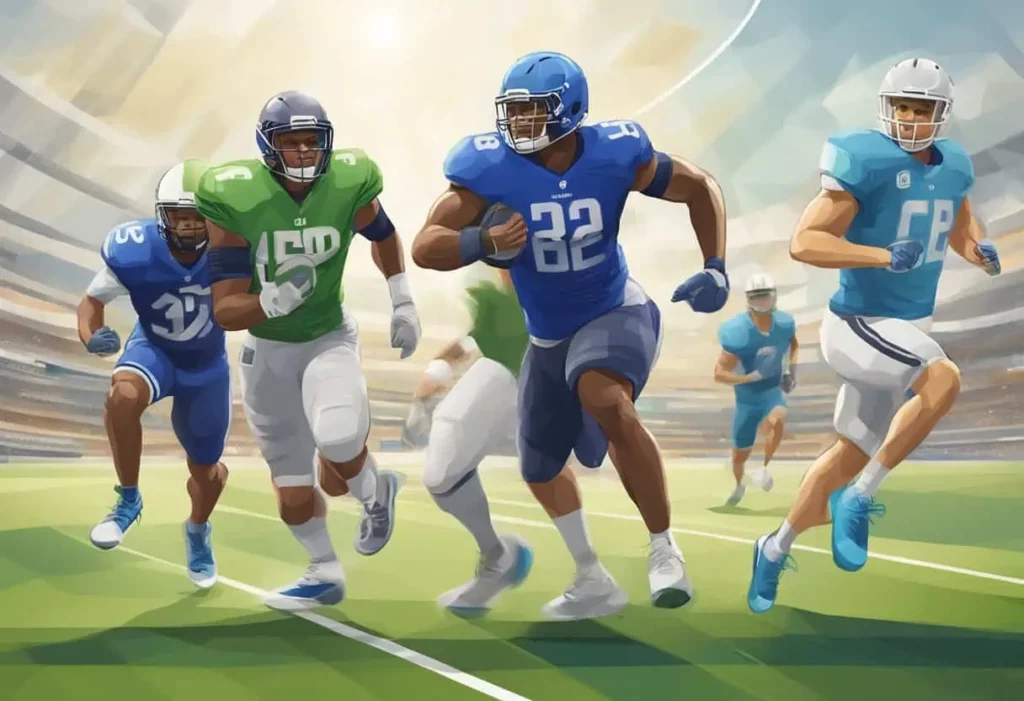Cannabidiol, commonly known as CBD, has seen a surge in popularity among athletes in recent years.
As a non-psychoactive compound found in cannabis, CBD has attracted interest for its potential to alleviate pain, reduce inflammation, and improve recovery times after intense workouts. It’s considered by many as a natural alternative to traditional medications, with users reporting benefits for both physical and mental well-being.
While there is a growing body of anecdotal evidence supporting its use, scientific research into CBD’s effects on athletic performance and recovery is still evolving.
There is a debate regarding its efficacy, as studies continue to investigate how CBD interacts with the body’s endocannabinoid system, which is responsible for maintaining homeostasis.
Moreover, concerns about legality and regulation, particularly in professional sports, remain a topic of discussion as organizations like the World Anti-Doping Agency monitor and update their lists of prohibited substances.
Key Takeaways
- CBD is gaining popularity among athletes for its perceived benefits on pain, inflammation, and recovery time.
- Scientific research is ongoing to better understand CBD’s impact on athletic performance and the body’s endocannabinoid system.
- Legal and regulatory considerations for CBD in professional sports are evolving as agencies regularly review their policies.
The Science of CBD and Cannabinoids
The exploration of cannabidiol (CBD) and tetrahydrocannabinol (THC) in the realm of sports has garnered significant attention for their potential roles in athlete performance and recovery. This section delves into the scientific aspects of CBD, THC, and the broader context of cannabinoids within the human body.
Understanding Cannabidiol (CBD) and THC
Cannabidiol (CBD) and tetrahydrocannabinol (THC) are the most prevalent and well-studied compounds in the cannabis plant.
Unlike THC, CBD does not produce psychoactive effects, making it an appealing option for athletes seeking therapeutic benefits without impairment.
CBD is extracted from hemp, a variety of the Cannabis sativa plant species that is low in THC and is often cultivated for industrial uses. The properties of CBD have been investigated for its potential to alleviate pain, reduce inflammation, and support recovery.
Cannabinoids and the Endocannabinoid System
Cannabinoids are classified into two types: endogenous and exogenous.
Endogenous cannabinoids, or endocannabinoids, are naturally occurring compounds in the human body that help regulate various physiological processes.
Exogenous cannabinoids, such as CBD and THC, are introduced into the body from external sources like the cannabis plant. These compounds interact with the body’s cannabinoid receptors, primarily CB1 and CB2, found throughout the central nervous and immune systems.
The endocannabinoid system plays a crucial role in maintaining homeostasis by influencing pain, appetite, mood, and memory.
Exogenous cannabinoids can influence this system, potentially mimicking or augmenting the effects of endocannabinoids.
However, research into the impact of cannabinoids on athlete performance and recovery is ongoing, with a need for further scientific exploration highlighted in studies on CBD and sports performance and CBD use in athletes.

Legality and Regulation of CBD in Sports
The landscape of CBD use in sports is a complex interplay of global drug policies and evolving scientific understanding. Athletes navigating this terrain must remain informed about authoritative stances and national regulations.
World Anti-Doping Agency Stance on CBD
The World Anti-Doping Agency (WADA) has a specific stance on CBD: it is not listed among banned substances. However, they caution that other cannabinoids are prohibited in-competition.
Due to the risk of THC contamination, WADA advises athletes to exercise caution when considering CBD products.
As of 2018, CBD was explicitly removed from the Prohibited List, which marked a significant shift in sports regulation. Athletes can use CBD, but it must not contain THC, the psychoactive component typically found in cannabis.
Legal Status of CBD in Various Countries
The legal status of CBD varies significantly around the world.
In the United States, the 2018 Farm Bill removed hemp-derived CBD with less than 0.3% THC from the definition of marijuana in the Controlled Substances Act. This made CBD legal at the federal level, although state regulations can differ.
Countries have diverse approaches; some align with WADA’s ruling, while others maintain stringent controls. Athletes must stay informed of the specific regulations in their country to avoid inadvertently violating local laws, which could have serious implications for their career.
CBD’s Role in Athletic Performance and Recovery
Cannabidiol (CBD) has emerged as a supplement of interest in sports, attributed to its purported benefits in pain and stress management, which are critical in athletic performance and recovery.
Athletes are turning to CBD to find relief and support in these areas without the side effects associated with traditional medications.
Pain Management
CBD may offer pain relief for athletes engaging in high-intensity activities by interacting with the body’s pain receptors.
Studies provide insights on how CBD could improve performance and recovery by assisting in the control of pain after strenuous exercise, potentially leading to more effective pain management without the need for traditional pain medication.
Inflammation and Recovery
Post-exercise inflammation can signal the start of the recovery process, but excessive inflammation may hinder it.
The anti-inflammatory properties of CBD might offer an avenue for athletes to manage inflammation, thereby facilitating improved recovery.
By possibly reducing the inflammation that comes with muscle tension and damage after exercise, CBD could help athletes feel more recovered and ready for subsequent training sessions.
Stress, Sleep, and Concentration
Athletic performance isn’t solely physical—it also encompasses mental well-being.
The anxiolytic effects of CBD might help in reducing stress, while also promoting better rest and sleep, both of which are vital for recovery and maintaining focus.
Improved sleep and concentration are beneficial for athletes who need to remain attentive and execute strategies during competition.
Muscle Soreness and Damage
Intense physical activity can lead to muscle soreness and damage, often resulting from micro-tears in the muscle fibers.
CBD’s potential role in the modulation of skeletal muscle metabolism could help in tissue regeneration and anabolism, thus aiding in the management of muscle soreness and facilitating quicker repair of the damaged muscle tissue.
Health Implications of CBD Use for Athletes
The use of CBD among athletes has sparked interest due to its potential to alleviate pain and aid in recovery, yet there is a need to balance these possible benefits against any risks and side effects.
Potential Benefits and Therapeutic Effects
CBD, a non-intoxicating cannabinoid found in hemp, has gained popularity in athletic communities for its potential therapeutic effects.
Athletes turn to CBD oil for its anti-inflammatory and analgesic properties, which might help with pain and recovery post-exercise.
The compound interacts with the body’s endocannabinoid system and can influence receptors that modulate pain and inflammation.
Studies suggest that, in humans, CBD may also possess neuroprotective qualities, which could be beneficial in sports that have a risk of head injuries.
As a medication, Epidiolex is an FDA-approved CBD isolate that exemplifies the therapeutic quality of CBD in treating specific seizure disorders, indicating the compound’s significant medicinal potential.
- Anti-inflammatory: CBD may help reduce inflammation, aiding recovery.
- Analgesic: Athletes might find relief from exercise-induced pain through CBD’s pain management effects.
Risks and Side Effects
Though many athletes use CBD products to support their health and recovery routines, they must also consider potential risks and side effects.
CBD, like any supplement or medication, can interact with other medications, possibly affecting their efficacy or leading to adverse reactions.
The ingestion of CBD oil has been linked to changes in appetite and potential liver issues in some people.
Given the unregulated nature of the supplement industry, concerns about the quality and purity of over-the-counter CBD products remain, as these might contain varying levels of the active ingredient or even contaminants.
It’s imperative for athletes, especially those in leagues such as the NFL, to verify the composition of CBD supplements to avoid prohibited substances.
CBD and Mental Health
The impact of CBD on mental health is another area of interest. CBD is believed to aid in regulating mood by affecting the endocannabinoid system. This system is linked to the body’s regulation of stress and anxiety. This influence on mood could promote better rest and recovery for athletes.
While non-intoxicating, CBD is different from the psychoactive effects of other cannabinoids like THC from the cannabis plant, which might lead to addiction or other mental health issues. Therefore, CBD use could be considered as an alternative to opioid medications for pain management, potentially reducing the risk of opioid addiction.
- Anxiety Relief: CBD may reduce symptoms of anxiety, aiding in mental recovery.
- Rest and Recovery: Better mood regulation could facilitate improved rest and quality of recovery.
Practical Considerations for Athlete CBD Use
When it comes to athlete usage of cannabidiol (CBD), understanding product selection and appropriate use is essential.
It is important to consider the legality of CBD products, as well as reputable sources that ensure quality and proper dosage advice for optimal benefits and compliance with sports regulations.
Product Types and Quality Control
Athletes have a broad selection of CBD products to choose from, including oils, capsules, and topicals.
Selection is critical as they contain differing concentrations of CBD and may also include tetrahydrocannabinol (THC), which can have legal and health implications.
Oils may offer a flexible dosing method, while capsules provide a controlled dosage. Topical applications are often used for isolated pain relief and muscle soreness.
Quality control is paramount as the market is saturated with CBD products of varying purity and potency.
Athletes should seek out CBD products that have undergone third-party testing with transparent results to ensure the absence of banned substances, like THC above legal thresholds.
The use of CBD products in professional sports, such as the NBA, is subject to the league’s cannabinoid policies; thus, verifying product compliance is crucial.
Dosage, Administration, and Timing
Determining the optimal dosage of CBD for an athlete can be complex, as it may vary based on an individual’s body weight, the type of sport, and the intended effects.
Low and slow is a common approach, starting with a minimal dosage and gradually increasing as needed.
Administration methods greatly influence the onset and duration of effects.
Sublingual oils or tinctures may take effect more quickly than edibles or capsules.
Timing also plays a significant role in the effectiveness of CBD for athletes.
CBD could be utilized for pre-workout focus, post-workout recovery, or even during exercise for endurance sports, although evidence is still emerging.
For regulatory reasons and to avoid potential health risks, athletes should avoid products with significant levels of THC and only use legal, high-quality CBD supplements, especially if subject to drug testing.

Athlete Advocacy and CBD Testimonials
In recent years, professional athletes have not only turned to CBD for managing pain and aiding recovery but also become vocal advocates for its use. Their testimonials have influenced public perception and opened up sponsorship opportunities with CBD brands.
Prominent Athletes Using CBD
Rob Gronkowski, a celebrated former NFL player, has been quite open about his choice to use CBD for pain management after retiring from professional football.
His endorsement brought significant attention to CBD’s potential benefits for athletes who commonly face chronic pain from the physical demands of their sports.
Megan Rapinoe, an iconic figure in women’s soccer, endorses CBD as a tool for recovery and wellness.
Her advocacy underscores the therapeutic use of CBD in professional sports, particularly in the NBA and NFL, where physical strain is a regular part of an athlete’s career.
Impact on Public Perception and Sponsorships
CBD endorsements by well-known athletes have significantly shaped public perception, painting CBD as a beneficial supplement for recovery and wellness.
This shift has led to lucrative sponsorship deals between CBD brands and athletes, indicating a growing acceptance of CBD in professional sports.
Athletes’ firsthand experiences and their status as role models contribute to a more neutral and knowledgeable discussion surrounding the use of CBD, potentially influencing future policies in professional sports leagues.

Future of CBD in Sports
The evolving landscape of CBD in sports hinges on rigorous research and changing regulatory frameworks, both of which will define the future integration of cannabis-derived products in athletic settings.
Research Directions
In the pursuit of understanding CBD’s role in sports, future studies are expected to focus on the interaction between cannabinoid receptors and CBD’s potential to enhance performance and recovery.
The central and peripheral nervous systems are prime targets for research, given their relevance to an athlete’s physiological functions.
Research on CBD’s influence on GABA channels, serotonin, and ion channels could illuminate its effects on stress, anxiety, and muscle tension, which in turn, affect performance.
Notable studies like the narrative review of CBD and sports performance suggest the need for such targeted investigations.
Changing Regulations and Attitudes
Regulations around cannabis and its cannabinoids, including CBD, have been shifting, with the World Anti-Doping Agency (WADA) removing CBD from its list of banned substances, albeit with caution. However, other cannabinoids found in the cannabis plant remain prohibited.
Legal products containing CBD are increasingly prevalent in countries with loosening cannabis regulation, contributing to changing attitudes toward its use as medication and for performance purposes in sports.
The World Health Organization recognizes CBD’s benefits and its low risk profile, which could influence further regulatory changes.
Several countries have approved CBD oils for treatment-resistant epilepsy, signaling a growing acceptance in the medical community.
Frequently Asked Questions
The following frequently asked questions are designed to provide athletes with essential information regarding CBD use for enhancing athletic performance, recovery, and overall wellbeing.
What are the benefits of CBD for athletic performance?
CBD may offer pain management benefits which are crucial for athletes recovering from injuries. Some research suggests that athletes may use CBD to manage pain and anxiety effectively.
Is CBD use permitted by major sports leagues?
Major sports leagues are starting to permit CBD use, as it was removed from the World Anti-Doping Agency’s list of prohibited substances. However, policies vary by league and athletes are advised to consult their governing bodies’ regulations.
How does CBD oil interact with the body to support muscle recovery?
CBD oil is thought to interact with the body’s endocannabinoid system, which may help reduce inflammation and thereby support muscle recovery. However, scientific consensus on its efficacy and mechanisms is still developing.
What format of CBD is most effective for sports-related use?
There is no definitive answer as to which format of CBD is most effective, as this can vary depending on personal preference and the specific condition being addressed. Options include tinctures, topicals, and edibles.
What are the recommended dosages of CBD for athletes?
Recommendations for CBD dosages can vary greatly. Athletes should start with a low dosage and adjust according to their body’s response. It is important to consult with a healthcare provider for personalized dosing advice.
What considerations should athletes keep in mind when choosing CBD products?
Athletes should consider product purity and the presence of third-party testing. They should also consider the type of CBD and ensure there are no banned substances in the product.
A high prevalence of cannabidiol use has prompted the need for regulated and standardized products.
Last Updated on May 8, 2024 by Megan Mbengue, BSN, RN, CHPN


